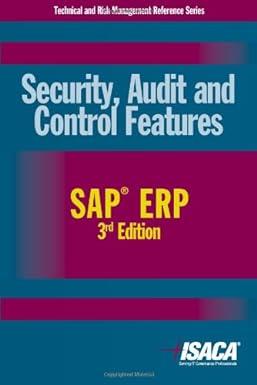Question
For big purchases, many stores offer a deferred billing option (buy now, pay later) that allows shoppers to buy things now without paying the bill
For big purchases, many stores offer a deferred billing option (buy now, pay later) that allows shoppers to buy things now without paying the bill at checkout.
- Assume you bought new appliances for your newly renovated home. Using the table range values below, choose one total value for the appliances that you have purchased based on the first letter of your last name. Denote this by P. It does not necessarily have to be a whole number.
| First letter of your last name | Possible range values for P |
| AF | $4,000$4,999 |
| GL | $5,000$5,999 |
| MR | $6,000$6,999 |
| SZ | $7,000$7,999 |
Type your chosen value here: (4 points)
| Total value of the appliances, P | $ |
- The store where you bought these appliances offered you a provision that if you pay the bill within 3 years, you will not be charged any interest for your purchases. However, if you are even a day late in paying the bill, the store will charge you interest for the 3 years.
Choose an interest rate between 12% and 16%. Denote this by r, and convert your answer into decimal form. (4 points)
| Annual interest rate in decimal form, r |
|
- Suppose you forget about the bill and pay it 1 day late. How much interest do you pay if the store charges you simple interest? Because this is a dollar value, round your answer to the nearest cent. (Assume t = 3 years.)
| Interest, I | $ |
Show and explain your work here: (5 points)
- How much is your total billthe total value of the appliances plus the interest? Round your answer to the nearest cent.
| Total bill (simple interest) | $ |
Show and explain your work here: (5 points)
- How much is your total bill if, instead, the store charges you interest that is compounded daily? Use 6 digits on your intermediate calculations, and round your final answer to the nearest cent. (Assume t = 3 years.)
| Total bill (compound interest) | $ |
Show and explain your work here: (6 points)
- How much interest do you pay if it is compounded daily? Round your answer to the nearest cent.
| Interest, I | $ |
Show and explain your work here: (5 points)
For big purchases, many stores offer a deferred billing option (buy now, pay later) that allows shoppers to buy things now without paying the bill at checkout.
- Assume you bought new appliances for your newly renovated home. Using the table range values below, choose one total value for the appliances that you have purchased based on the first letter of your last name. Denote this by P. It does not necessarily have to be a whole number.
| First letter of your last name | Possible range values for P |
| AF | $4,000$4,999 |
| GL | $5,000$5,999 |
| MR | $6,000$6,999 |
| SZ | $7,000$7,999 |
Type your chosen value here: (4 points)
| Total value of the appliances, P | $ |
- The store where you bought these appliances offered you a provision that if you pay the bill within 3 years, you will not be charged any interest for your purchases. However, if you are even a day late in paying the bill, the store will charge you interest for the 3 years.
Choose an interest rate between 12% and 16%. Denote this by r, and convert your answer into decimal form. (4 points)
| Annual interest rate in decimal form, r |
|
- Suppose you forget about the bill and pay it 1 day late. How much interest do you pay if the store charges you simple interest? Because this is a dollar value, round your answer to the nearest cent. (Assume t = 3 years.)
| Interest, I | $ |
Show and explain your work here: (5 points)
- How much is your total billthe total value of the appliances plus the interest? Round your answer to the nearest cent.
| Total bill (simple interest) | $ |
Show and explain your work here: (5 points)
- How much is your total bill if, instead, the store charges you interest that is compounded daily? Use 6 digits on your intermediate calculations, and round your final answer to the nearest cent. (Assume t = 3 years.)
| Total bill (compound interest) | $ |
Show and explain your work here: (6 points)
- How much interest do you pay if it is compounded daily? Round your answer to the nearest cent.
| Interest, I | $ |
Show and explain your work here: (5 points)
- Based on the result of your calculations, write a summary about the difference between simple and compound interest. Explain your answer. (6 points)
- Do you think a deferred billing option is helpful for shoppers? Explain your answer. (5 points)
- Based on the result of your calculations, write a summary about the difference between simple and compound interest. Explain your answer. (6 points)
- Do you think a deferred billing option is helpful for shoppers? Explain your answer. (5 points)
Step by Step Solution
There are 3 Steps involved in it
Step: 1

Get Instant Access to Expert-Tailored Solutions
See step-by-step solutions with expert insights and AI powered tools for academic success
Step: 2

Step: 3

Ace Your Homework with AI
Get the answers you need in no time with our AI-driven, step-by-step assistance
Get Started


